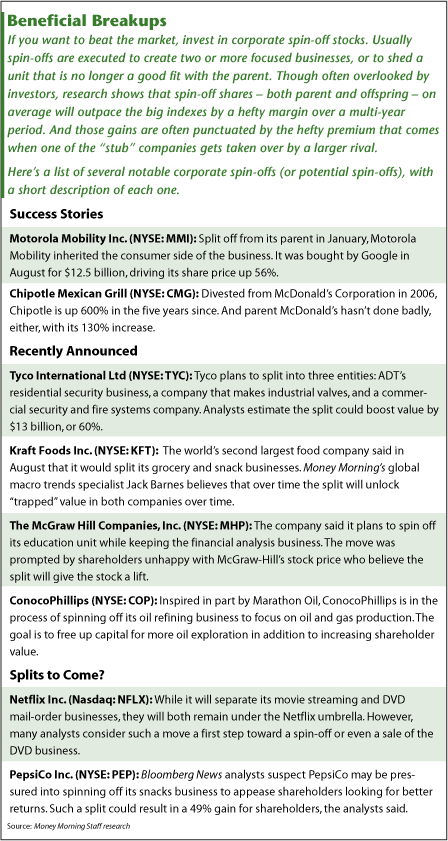Corporate spin-offs, though not as sexy as mergers or initial public offerings (IPOs), often reward stockholders of both the parent and offspring companies - if they're patient.
In fact, the stocks of 60% of spin-off companies end up in positive territory one year after a split, according to London-based The Spinoff Report.
"There's value in the [spin-off] company prior to the event that generally gets missed," said Ryan Mendy, Chief Operating Officer of The Spinoff Report.
After some slow years during the market downturn of 2008-2009, corporate spin-off activity has revived.
Globally there have been 46 spin-offs of companies valued at over $250 million this year, according to The Spinoff Report. That compares with 36 last year and just 27 in 2009.
A few of the recently announced major spin-offs include The McGraw Hill Companies Inc. (NYSE: MGH), Tyco International Ltd. (NYSE: TYC), and Kraft Foods Inc. (NYSE: KFT).
Tyco is actually splitting into three pieces, which analysts estimate could boost shareholder value by 60%.
"The idea is to create smaller and more focused businesses," J. Randall Woolridge, finance professor at Penn State University, told USA Today.
Both spin-offs and their parents tend to outperform the market. According to a study done by The Spinoff Report of more than 500 corporate spin-offs between 2000 and 2010, the stocks of 58% of the parents and 60% of the spin-offs were up after one year.
Better yet, they were up significantly. The parent companies climbed more than 17% on average and the spin-offs themselves soared more than 24%.
The Corporate Spin-Off Payoff
That a division is being spun off doesn't necessarily mean it's doing poorly; often it's a unit that is simply no longer a good fit with the parent company. Such is the case with Sara Lee Corp. (NYSE: SLE), which is spinning off its coffee and tea business.
Stockholders can benefit from spin-offs in several ways. Frequently the resulting company performs much better as a separate business: About 30% of spin-offs are acquired by another company within two years. That can give the stock a quick and dramatic pop.
Witness the shares of Motorola Mobility Inc. (NYSE: MMI). Corporate parent Motorola split in two in January, with Motorola Mobility being the cellphone and consumer product portion of the business.
Just seven months later Google Inc. (Nasdaq: GOOG) announced plans to buy Motorola Mobility for $12.5 billion. Shares of MMI rose 56%.
The only downside in a case like Motorola Mobility is that it was bought too quickly; if the deal closes less than a year after the stock was listed, shareholders will owe capital gains taxes at the higher short-term rate.

Choosing Wisely
Despite the excellent track record, not every spin-off will be a winner; investors still need to do their homework.
Some things to keep in mind while considering corporate spin-off stocks:
- They tend to be more volatile due to their smaller capitalizations and ability to generate income, so they usually do better in bull markets.
- They may sell off in the period just after the new company debuts because shareholders of the parent may not want shares of the spin-off, and because index funds will be forced to sell a new company not in the index.
- You should peruse the fundamentals as you would with any stock, particularly debt and valuation levels.
- And, of course, be patient.
The Spinoff Report's Mendy has some additional tips for those who'd like to wade into world of investing in corporate spin-offs.
For example, the best-performing sector for spin-offs is conglomerates, which tend to go through the process in a more orderly fashion. The worst sector is financials, Mendy said.
Another factor is market capitalization. Mendy's data shows that the stocks of small-cap and large-cap parent firms involved in a split performed 50% poorer than mid-cap parent companies after one year.
For the spin-offs companies, the reverse is true, with the offspring of mid-cap companies having the advantage.
Needless to say, the more you know the better.
"It's an educated gambler's game," Mendy observed. But the promise of exceptional performance makes finding the right corporate spin-offs worth the effort.
"IPOs may be pure capitalism," Mendy said, "but spin-offs are alpha capitalism."
News and Related Story Links:
- Money Morning:
Kraft Foods Inc.'s (NYSE: KFT) Spin-off Strategy Will Unlock Value for Investors - Money Morning:
The Google-Motorola Deal: Winners and Losers - Money Morning:
With the Sale of Arby's, Wendy's Stock Deserves a Fresh Look - Money Morning:
Buy, Sell or Hold: With its Laser Focus on China, It's Time To Buy McDonald's Corp. (NYSE: MCD) - The Spinoff Report:
Website - Investopedia:
Parents And Spin-offs: When To Buy And When To Sell - The Globe and Mail:
The courage to shrink - Forbes:
2011: Year Of The Breakup - USA Today:
Spinoffs become hot stock-price strategy - Reuters:
Spin-off trend isn't just for investment bankers - Motley Fool:
The Hottest Trend in Investing Today
About the Author
David Zeiler, Associate Editor for Money Morning at Money Map Press, has been a journalist for more than 35 years, including 18 spent at The Baltimore Sun. He has worked as a writer, editor, and page designer at different times in his career. He's interviewed a number of well-known personalities - ranging from punk rock icon Joey Ramone to Apple Inc. co-founder Steve Wozniak.
Over the course of his journalistic career, Dave has covered many diverse subjects. Since arriving at Money Morning in 2011, he has focused primarily on technology. He's an expert on both Apple and cryptocurrencies. He started writing about Apple for The Sun in the mid-1990s, and had an Apple blog on The Sun's web site from 2007-2009. Dave's been writing about Bitcoin since 2011 - long before most people had even heard of it. He even mined it for a short time.
Dave has a BA in English and Mass Communications from Loyola University Maryland.



